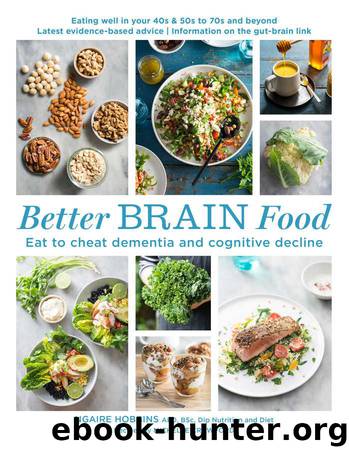Better Brain Food: Eat to cheat dementia and cognitive decline by Hobbins Ngaire & Crawford Michelle

Author:Hobbins, Ngaire & Crawford, Michelle [Hobbins, Ngaire]
Language: eng
Format: azw3
Publisher: Murdoch Books
Published: 2017-07-26T04:00:00+00:00
LET’S TALK ABOUT SALT
Eating to help your brain is all about balance and, when it comes to salt, that is no exception. Eating too much salt contributes to things like hypertension (high blood pressure), stroke and transient ischaemic attacks (TIAs, also called mini-strokes), all of which can impact brain health. Most heart- and brain-health strategies advocate keeping salt intake to a minimum and this book is no exception. Some of the recipes in this book do use small amounts of salt, but you are not going to eat only those foods. Again, it comes down to balance: these recipes are not intended to be your whole day’s eating plan and combining them with plenty of vegetables and fruits is important, as is keeping down your intake of commercial foods — takeaway (take-out) and prepackaged meals, commercial cakes, biscuits, pastries and snack foods — that have salt added during processing.
Remember that not all foods that are high in salt will taste ‘salty’: bread, many breakfast cereals, prepackaged meals and commercial baked goods can contribute as much, or more, than the salty snack and takeaway foods you already know to avoid.
Another important consideration is that it’s not so much sodium itself that is the issue, but a high intake of salt upsets an important balance between sodium and the essential mineral, potassium. Eating plenty of foods that contain potassium, but are not also high in salt (sodium) is key, and the great thing is that those foods are, by and large, the ones I recommend to form the basis of your eating plan: minimally processed vegetables, fruits, wholegrains, pulses, dairy foods, fish and meats can all contain potassium. Some foods are especially high in potassium: most yellow or orange fruits (particularly bananas and tropical fruits), dried fruits, tomatoes, legumes, lentils and dried beans of all types, dark green vegetables, potatoes, powdered milk, nuts and seeds, bran cereals and chocolate to name a few. Eating as many different vegetables, fruits and other foods that do not have salt added in their production will give you a potassium boost and help keep that sodium–potassium balance in line.
The taste for salt is an acquired one: if you are used to salty foods, cut down gradually to allow your taste buds to adapt to a lower intake. Conversely, if you don’t usually add salt during cooking then foods with added salt will taste more ‘salty’ than you might like. The great advantage of preparing your own meals is that you can choose whether to add salt or not, both in the recipes in this book, in other recipes or at the table.
Of course, if you have medical issues and have been prescribed a low-salt diet, requiring you to use no salt at all in cooking, then naturally you need to adhere to that when preparing these recipes. Otherwise, the choice is yours to salt or not.
Download
This site does not store any files on its server. We only index and link to content provided by other sites. Please contact the content providers to delete copyright contents if any and email us, we'll remove relevant links or contents immediately.
| Administration & Medicine Economics | Allied Health Professions |
| Basic Sciences | Dentistry |
| History | Medical Informatics |
| Medicine | Nursing |
| Pharmacology | Psychology |
| Research | Veterinary Medicine |
Periodization Training for Sports by Tudor Bompa(8254)
Why We Sleep: Unlocking the Power of Sleep and Dreams by Matthew Walker(6706)
Paper Towns by Green John(5179)
The Immortal Life of Henrietta Lacks by Rebecca Skloot(4580)
The Sports Rules Book by Human Kinetics(4379)
Dynamic Alignment Through Imagery by Eric Franklin(4208)
ACSM's Complete Guide to Fitness & Health by ACSM(4057)
Kaplan MCAT Organic Chemistry Review: Created for MCAT 2015 (Kaplan Test Prep) by Kaplan(4008)
Introduction to Kinesiology by Shirl J. Hoffman(3766)
Livewired by David Eagleman(3765)
The Death of the Heart by Elizabeth Bowen(3610)
The River of Consciousness by Oliver Sacks(3599)
Alchemy and Alchemists by C. J. S. Thompson(3516)
Bad Pharma by Ben Goldacre(3422)
Descartes' Error by Antonio Damasio(3271)
The Emperor of All Maladies: A Biography of Cancer by Siddhartha Mukherjee(3155)
The Gene: An Intimate History by Siddhartha Mukherjee(3095)
The Fate of Rome: Climate, Disease, and the End of an Empire (The Princeton History of the Ancient World) by Kyle Harper(3055)
Kaplan MCAT Behavioral Sciences Review: Created for MCAT 2015 (Kaplan Test Prep) by Kaplan(2984)
